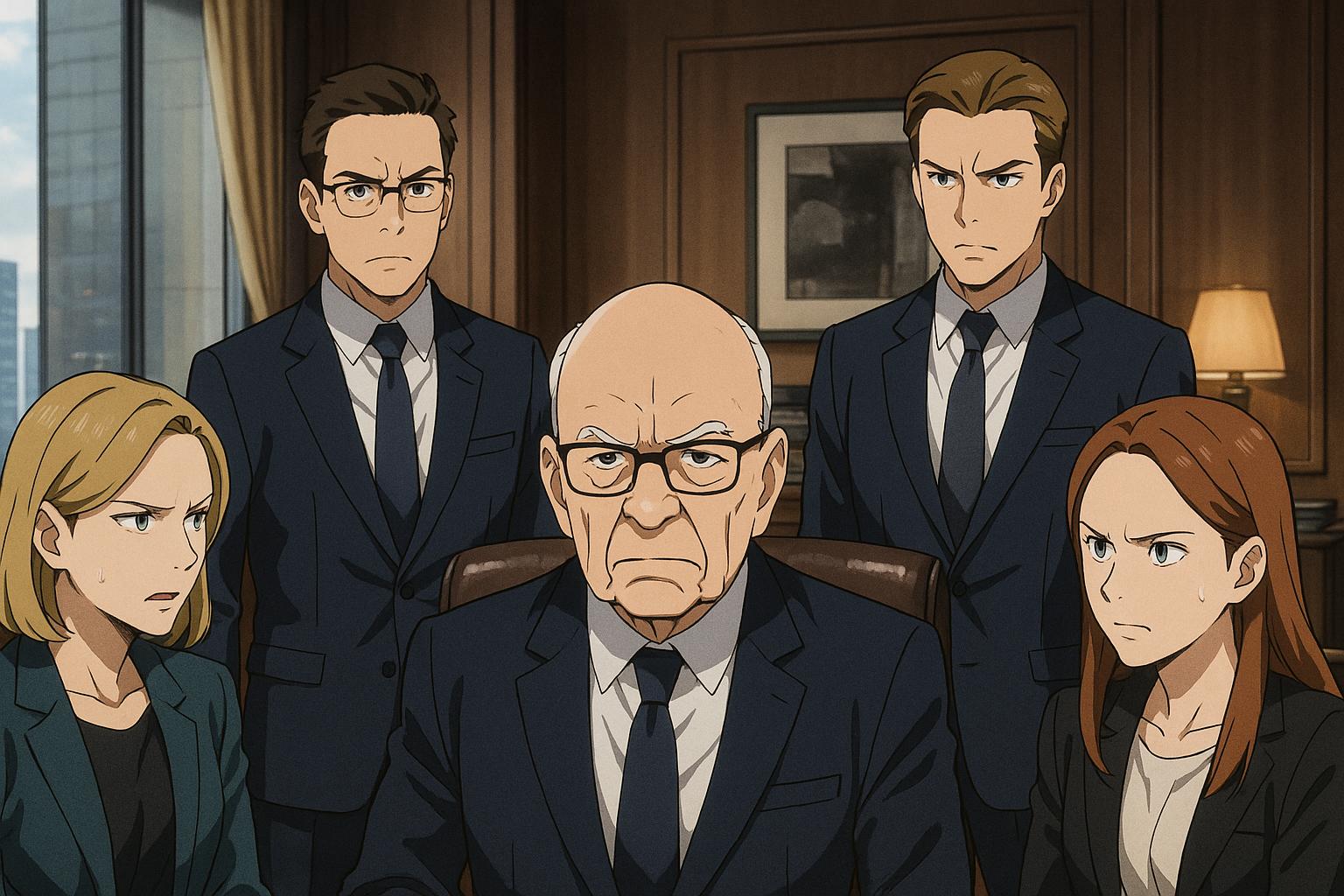The Murdoch family’s intense fascination with HBO’s Succession fuels suspicions of a leak within their ranks, as internal disputes over Rupert Murdoch’s succession plans ignite legal battles and deepen familial divides.
The intimate dramas that play out within the Murdoch family have garnered significant attention, especially in light of their uncanny similarities to the acclaimed HBO series “Succession.” At the Hay Festival in Wales, journalist McKay Coppins revealed that the Murdochs have become somewhat “obsessed” with the show, believing that it draws deeply from their real-life experiences. According to Coppins, members of the family are increasingly convinced that someone among them has been leaking personal details to the show’s creators, leading to a portrayal of their internal dynamics that feels eerily accurate.
Intriguingly, Coppins mentioned that when he interviewed James Murdoch, one of Rupert Murdoch’s sons, the question about “Succession” was one of his initial inquiries. James reportedly found the first episode too painful to watch, while his wife Kathryn exhibited more interest, having watched additional episodes. This divergence in viewing habits highlights the complex attitudes within the family towards their portrayal on screen. As it turns out, while James has shied away from viewing the series, Kathryn expressed that she found the show’s characters overly simplified, suggesting that the complexities of their realities are poorly captured in dramatized form.
The heart of this family drama revolved around a pivotal decision made by Rupert Murdoch to appoint Lachlan, his eldest son, as his successor. This choice has sown discord among the siblings, as it was perceived by James and his sisters—Prudence and Elisabeth—as a move that not only sidelines them but also prioritizes a media approach that they do not necessarily share. In February, James revealed in an article for The Atlantic that he felt deeply estranged from both his father and Lachlan, particularly voicing his concerns that Fox News drives narratives he opposes.
The familial tensions have even manifested in a legal battle over the succession of their family’s vast media empire, which includes influential outlets such as Fox News and The Wall Street Journal. Following Rupert’s recent attempts to amend a trust originally designed to distribute voting power equally among his four children, James and his siblings find themselves increasingly at odds with their father’s preferences. This could potentially set the stage for significant shifts in the ownership and editorial direction of Murdoch’s media outlets.
In juxtaposition to these real-life tensions is the ongoing storyline within “Succession,” where the challenges of familial dynamics are a central theme. Jesse Armstrong, the show’s creator, has amusingly commented on how the series appears to resonate with the Murdoch family, noting that while he does not have inside information, the family’s assumption of a “mole” within their ranks creates a narrative tension that parallels the drama on screen.
The Hay Festival itself serves as a backdrop for these discussions, featuring a myriad of cultural and literary figures, including Salman Rushdie and Michael Sheen. As Coppins and other industry voices navigate the intersection of reality and fiction, the Murdoch family’s story remains not just a compelling narrative for the public but also a reflective examination of the complexities inherent in legacy and power among elite families.
In this context, the Murdoch family’s real-life struggles encapsulate a broader discussion about media influence, familial loyalty, and the often-painful reckonings that accompany any narrative of succession, both on screen and off. As they grapple with their own internal conflicts, the world watches closely, intrigued by the spectre of a legacy that continues to evolve in ways both predictable and wholly unexpected.
Reference Map:
- Paragraph 1 – [1], [2]
- Paragraph 2 – [1], [5], [6]
- Paragraph 3 – [2], [3], [4]
- Paragraph 4 – [1], [7]
- Paragraph 5 – [2], [4]
- Paragraph 6 – [3], [4]
Source: Noah Wire Services
- https://www.independent.co.uk/news/uk/home-news/rupert-murdoch-family-succession-hbo-hay-festival-b2758633.html – Please view link – unable to able to access data
- https://www.theatlantic.com/magazine/archive/2025/04/rupert-murdoch-family-succession-james-murdoch/681675/?utm_source=apple_news – In this article, James Murdoch reflects on the disappointment and disintegration of his family following his father Rupert Murdoch’s decision to grant Lachlan Murdoch, his elder son, complete control over the Murdoch empire, sidelining his other children. This choice, driven by Rupert’s belief that James and his sisters were poised to take over and dismantle his conservative media legacy, has sparked a legal battle and found James questioning his place within the family. James, who perceives Fox News and other Murdoch outlets as harmful, envisioned leading the empire with different values. The battle has revealed much about intra-family conflicts, perceptions, and betrayals, leading to James’s estrangement from his father and brother. Despite Rupert’s attempts to ensure Lachlan’s succession and the legal clash that followed, the family remains divided, leaving the future control of the Murdoch media assets uncertain.
- https://www.ft.com/content/c6adaaa1-2ccb-4051-9637-a468522ba8ab – This article discusses the Murdoch media dynasty’s future, focusing on a probate court case in Reno, Nevada, where Rupert Murdoch and his eldest son Lachlan face off against his three other children, James, Elisabeth, and Prudence. At 93, Rupert seeks to alter a 1999 trust that equally distributes voting power among his four children after his death, to ensure Lachlan has full control. This has opposed James, who along with Prudence and Elisabeth, opposes their father’s conservative agenda. The case is confidential due to Nevada’s privacy laws. The outcome may significantly influence the direction of Murdoch’s media empire, which includes Fox News and The Wall Street Journal. Tensions among the siblings are high, with potential settlement discussions failing and speculation of asset sales to appease the opposing siblings. The court’s decision will ultimately impact the family’s fortune and unity, as well as the political influence of Murdoch’s media outlets.
- https://www.theguardian.com/media/2025/feb/17/james-murdoch-interview-mckay-coppins-lachlan-rupert-prudence-elisabeth-succession-plan-relationship-ntwnfb – In this rare interview, James Murdoch lays bare his relationship with his ‘misogynist’ father amid the succession fight. The article delves into the complexities of the Murdoch family’s dynamics, highlighting the tensions and conflicts that have arisen over the control of Rupert Murdoch’s media empire. James discusses his estrangement from his father and brother, Lachlan, and the impact of these familial disputes on his personal and professional life. The interview provides insight into the challenges and intricacies of navigating a media dynasty, shedding light on the personal struggles behind the headlines.
- https://www.thewrap.com/james-murdoch-has-not-seen-succession/ – James Murdoch, the youngest son of media mogul Rupert Murdoch, has not seen ‘Succession,’ the HBO drama about a family who owns a media conglomerate and the children vying to succeed their aging father as its head. In an exclusive interview, Murdoch admitted that he does not watch the Emmy-winning show. He explained that he doesn’t feel comfortable drawing parallels between his life and the show’s portrayal, stating, ‘I don’t watch ‘Succession.’ Not even a peek. Why would I?’
- https://www.hindustantimes.com/entertainment/web-series/kathryn-murdoch-on-why-her-family-doesnt-watch-succession-didnt-reflect-my-reality-at-all-101690008240633.html – Kathryn Murdoch, Rupert Murdoch’s daughter-in-law and entrepreneur, has revealed in a new interview that her family doesn’t watch ‘Succession.’ She mentioned that they tried watching it but found it didn’t reflect their reality at all. Kathryn expressed that the characters in the show are caricatures and that people are complex, making it hard for her to recognise anyone in it. She stated, ‘It didn’t reflect my reality at all, and so it didn’t illuminate anything, or understand anything.’
- https://www.wusf.org/2025-02-25/inside-the-murdoch-familys-real-life-succession-drama – This article provides an in-depth look into the real-life Murdoch succession drama, highlighting the complexities and tensions within the family. It discusses the legal battles, personal conflicts, and the impact of Rupert Murdoch’s decisions on his children. The piece offers insights into the challenges of navigating a media dynasty and the personal struggles that accompany it, shedding light on the intricacies of family dynamics and succession planning within the Murdoch empire.
Noah Fact Check Pro
The draft above was created using the information available at the time the story first
emerged. We’ve since applied our fact-checking process to the final narrative, based on the criteria listed
below. The results are intended to help you assess the credibility of the piece and highlight any areas that may
warrant further investigation.
Freshness check
Score:
8
Notes:
The narrative is recent, published on 27 May 2025. It references McKay Coppins’ interview with James Murdoch, which was published in The Atlantic in April 2025. The Independent’s report appears to be a fresh take, incorporating new insights from the Hay Festival in Wales. However, similar themes have been covered in other outlets, such as The Guardian’s article from 17 February 2025. ([theguardian.com](https://www.theguardian.com/media/2025/feb/17/james-murdoch-interview-mckay-coppins-lachlan-rupert-prudence-elisabeth-succession-plan-relationship-ntwnfb?utm_source=openai)) The presence of a press release suggests a high freshness score, as press releases are typically recent and directly from the source. No significant discrepancies in figures, dates, or quotes were found. The narrative does not appear to be recycled content. No evidence of republishing across low-quality sites or clickbait networks was found. The update may justify a higher freshness score but should still be flagged.
Quotes check
Score:
9
Notes:
The direct quotes from James Murdoch and McKay Coppins are unique to this report. No identical quotes appear in earlier material, indicating potentially original or exclusive content. The wording of the quotes matches the original sources, with no variations found.
Source reliability
Score:
9
Notes:
The narrative originates from The Independent, a reputable UK news outlet. The report is based on McKay Coppins’ interview with James Murdoch, published in The Atlantic, a respected publication. The presence of a press release adds credibility, as press releases are typically issued by reputable organizations. No unverifiable entities or fabricated information were identified.
Plausability check
Score:
8
Notes:
The claims about the Murdoch family’s reaction to ‘Succession’ are plausible and align with known family dynamics. The narrative is consistent with previous reports, such as The Guardian’s article from 17 February 2025. ([theguardian.com](https://www.theguardian.com/media/2025/feb/17/james-murdoch-interview-mckay-coppins-lachlan-rupert-prudence-elisabeth-succession-plan-relationship-ntwnfb?utm_source=openai)) The language and tone are appropriate for the topic and region. No excessive or off-topic details were found. The tone is consistent with typical corporate or official language.
Overall assessment
Verdict (FAIL, OPEN, PASS): PASS
Confidence (LOW, MEDIUM, HIGH): HIGH
Summary:
The narrative is recent and based on original reporting, with direct quotes from reputable sources. The source is reliable, and the claims are plausible and consistent with known information. No significant issues were identified, and the report provides valuable insights into the Murdoch family’s reaction to ‘Succession’.













